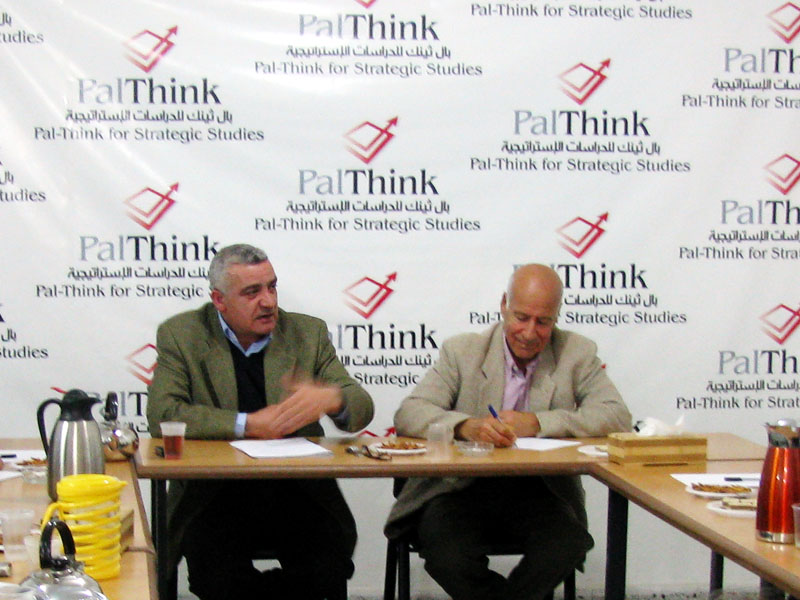Gaza-Sunday , 7th of March 2010 — Edward Said forum- the cultural forum of PalThink for Strategic Studies has organized a roundtable discussion entitled “The integration of Muslims in Europe, The case of the Netherlands”.
The main speaker was Mr. Omar Shaban, head of PalThink for Strategic Studies who presented his personal experience during his visit to Netherlands as a part of Arab opinion makers to the Netherlands program which took place in December 2009. The roundtable meeting was attended by a number of specialists, intellectuals, youth groups representatives and international non-governmental organizations executives – some of Dutch citizen who work in Gaza attended the session . Mr. Shaban started his talk by giving brief information about the Netherlands in terms of its economic , social structures, and political environment of the Netherlands.
“The Netherlands is a relatively small country in terms of area (41,526 km2), with a population of 16 million people, this means that population density per Km2 is 400 people, so we can consider it one of the largest countries of population density in Europe. The gross domestic income of Netherlands is 700 billion dollars yearly, unemployment rate is low as 5% – the lowest in Europe, and it depends on heavy industries, natural gas, tourism, exporting cheese and dairy products” Mr. Shaban said.
Going deeper in the core issue ,Mr. Shaban explained the importance of understanding the influential role of Netherlands as one of the countries that have the second largest Islamic population in Europe as well as its foreign policy that cannot be far away from the Islamic and Arab world. “The Muslims in the Netherlands is 6%, which makes it the second in Europe after France . Muslims in Netherlands enjoy a good atmosphere of freedom and coexistence, for example, the mayor of Rotterdam city is Dutch Muslim originally from Morocco , and there are more than 450 mosque and Islamic center in Netherlands, and more than 40 primary school for the Muslim community funded by the governmental treasury. Moreover, the Dutch government spends more than half a billion euros to support projects that help Muslims socially and economically” Mr. Shaban said.
Muslims issues in Netherlands
Mr. Shaban described the situation of Muslims in Netherlands; their statistics, religious groupings, ethnic backgrounds, and their social and political roles in the Dutch society. The presentation mentioned the roots of the current misunderstanding between the Muslim community and the Dutch people, Mr. Shaban analyzed the orientations of the Islamic community basing on a historical order, the analysis clarified the differences between the generations of migrants and their societal development until they called for civil rights. Moreover, Mr. Shaban has reviewed the current tensions among the Islamic community in Netherlands, particularly after the murder of the Dutch film maker Theo van Gogh by a Muslim gunman in 2004. He added that some radicals in the Netherlands has benefited from a wave of hostility to Muslims, which led to the mounting support for some right-wing parties such as Freedom Party led by Geert Wilders who funded the creation of a the controversial film ” Fitna “. Also, he mentioned that Islamic communities in Europe are trying to avoid the local Islamic intervention there, but it is hard for Muslims there not be affected by what is happening in the Islamic world.
At the end of his presentation, Mr. Shaban discussed the issues of identifying integration and the challenges facing the Muslim community in Netherlands and how to measure integration among the Islamic communities there. He added that Muslim’s duty is to promote understanding among their countries and communities as well as refusing external interventions that might affect their existence in Europe negatively.
Afterwards, the discussion started. One of the participants added that there should be a deep understanding for Netherlands because of its importance as an influential state that can affect policy making in Europe. A representative of a youth organization asked about the linkage and the relation between the tendency towards radicalism in the whole world and the economic crisis and regression, Mr. Shaban replied ” There is a strong relation between these factors, we can observe the orientation towards radicalism and this will affect the situation of Muslims in Europe”.
Mr. Omar Shaban ended the roundtable discussion by adding a small comment ” The Dutch society should realize the important role of the Islamic community. There is a need to study Netherlands well in order to identify integration and to keep this unique experience of freedom and coexistence not only unchanged, but to promote it more and more”.


